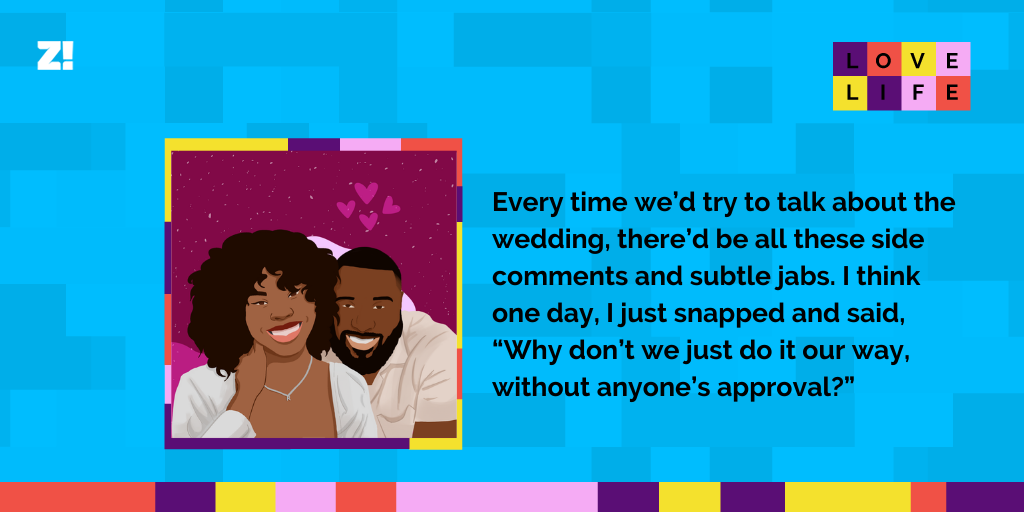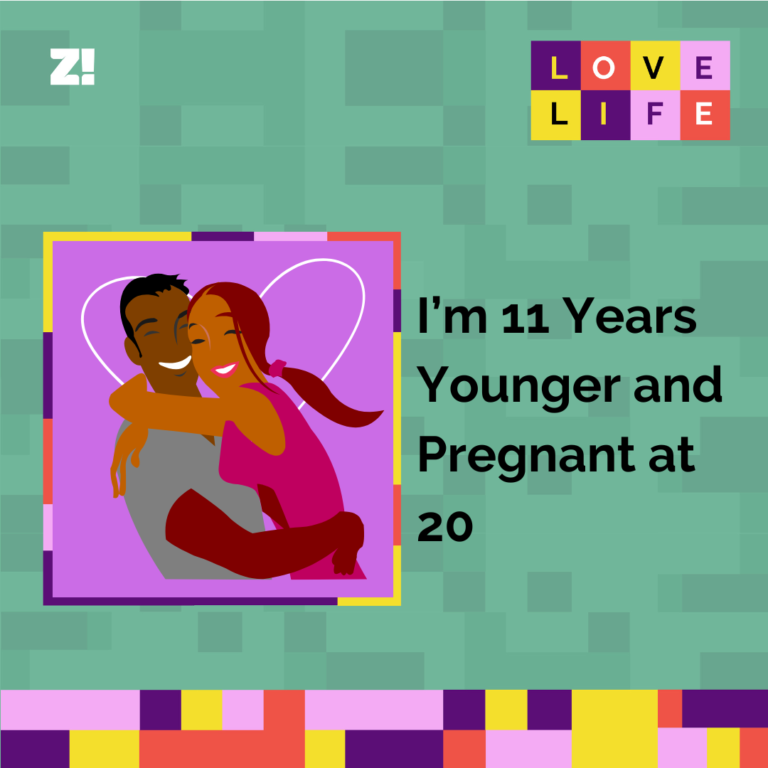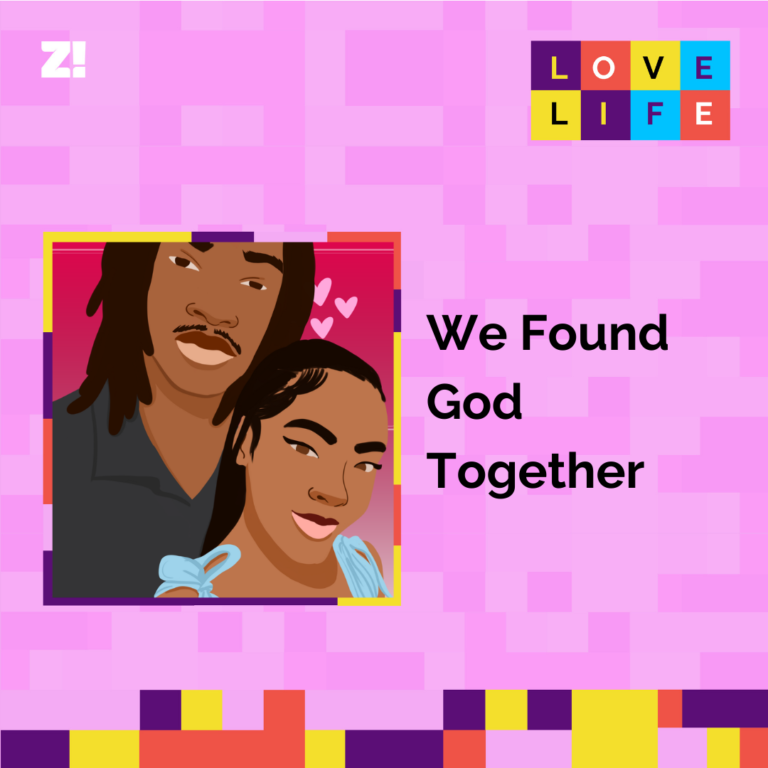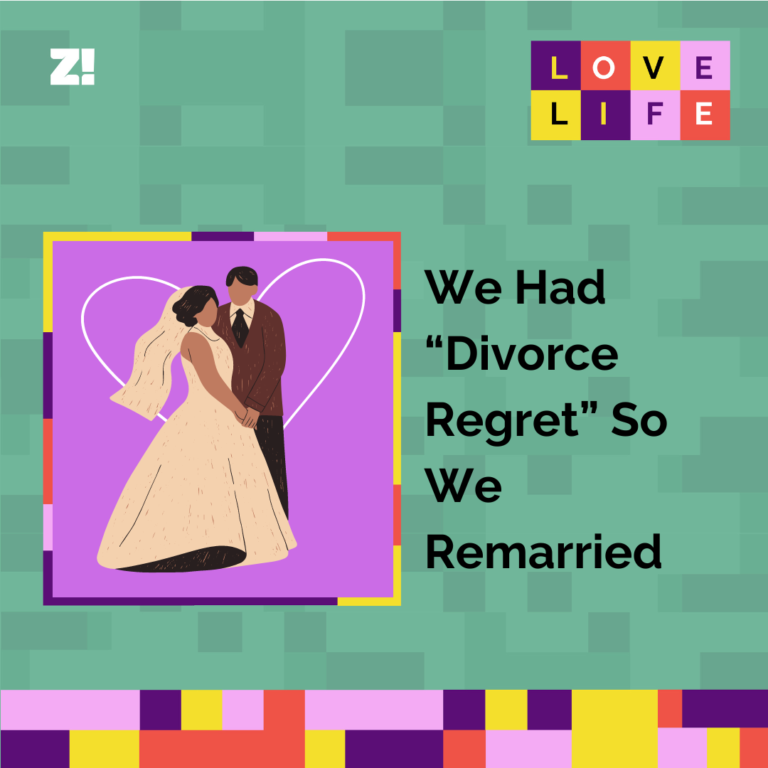Love Life is a Zikoko weekly series about love, relationships, situationships, entanglements and everything in between.

What’s your earliest memory of each other?
Amaka: Honestly, I was so embarrassed the first time we met. I spilt wine on his suit at our friend’s wedding. I expected him to get mad, but he laughed.
Dayo: I think it was funny because it was one of those lowkey “social distance” weddings. She was trying so hard to apologise, but I was more interested in how she handled the awkwardness. There was something about the way she spoke that I can’t explain.
Amaka: He was like, “It’s just fabric, not the end of the world.”
What happened next?
Amaka: He slid into my DMs the next day. I was surprised because we didn’t even talk much after the wine incident at the wedding. But he found me through the wedding hashtag and sent a message that said, “I think I owe you a drink for ruining my outfit.” It was cheeky, but I liked it.
Dayo: We started talking online. It was easy. No pressure. We clicked over photography and random memes. I wasn’t even thinking about dating at the time.
Amaka: We kept it simple, but I always had this quiet vibe that we’d be more than friends. Neither of us pushed it, though, which was probably the best part.
Why was it the best part?
Amaka: This was in August 2020. I’d just gotten promoted at a time when a lot of people were getting laid off, so I was really focused on my career. I’d also been single for about a year after a messy situationship, and honestly, I was happy on my own. Relationships felt like unnecessary drama at that point.
Dayo: It was right in the middle of the pandemic. Everything was crazy, and I was working from home full-time as a software engineer. I’d gotten out of a serious relationship a few months earlier, so I wasn’t in any rush to jump into something new either.
My last relationship ended because we wanted different things—she wanted to move abroad, and I was committed to staying in Lagos. So, when I met Amaka, I was honestly just chilling, not expecting much to come out of it.
Neat
Amaka: Yes. It made the whole thing feel less forced. When we did fall in love, it was just good vibes, no baggage from our past creeping in.
About a month after we met, we met up in person for the first time. Dayo suggested getting the drinks he said he owed me, and I was a bit hesitant. I wasn’t sure if I wanted to take it offline so soon, but something about him felt easy. So, we met at this quiet café in VI near my office—a safe, neutral territory.
Dayo: It wasn’t one of those grand, romantic first dates; we just talked. I ordered the most basic thing—black coffee—and she made fun of me for it. But that’s when I knew I liked her. There was no pretense. No one was trying to impress the other.
Is that when the relationship started?
Amaka: Not really. It wasn’t about sparks flying everywhere; it was more like slipping into something comfortable. I didn’t even realise three hours had passed that night until they were closing the café. We walked around for a bit after, and it felt… nice.
Dayo: We started talking about a relationship two months in, but it wasn’t a “DTR” (define the relationship) moment. It was more like, “Okay, we’re clearly on the same page here. Let’s stop pretending this is casual.”
Amaka, what was your response to this?
Amaka: I don’t remember. We never had that awkward “What are we?” conversation. It just evolved naturally.
I think the first time it felt serious was when he met my mum that Christmas. That was a big deal for me because she’s super protective, but he handled it well. After that, we kind of just knew we were in it for the long haul.
What was the relationship like once it started for real?
Amaka: Our dating period was very… simple, in the best way. There were no flashy date nights or grand gestures. It was more about the small things, like when I’d come home exhausted, and Dayo would just show up with shawarma or my favourite street suya without me asking.
Dayo: I think people sometimes over-complicate relationships. For us, it was the everyday moments that made it work.
I remember she’d make these fire playlists for me when I was coding late at night (she doesn’t anymore sha). I’d just have my headphones on, listening to whatever she put together while working, and it made those stressful nights easier.
Sounds like things got serious soon after this?
Amaka: It started feeling more serious when we both realised we were thinking long-term without even talking about it.
One Sunday, just after Valentine’s Day 2021, we were strolling around the area after lunch in a restaurant when I asked him, “Do you ever think about where this is going?”
I wasn’t trying to make it a deep conversation, so I didn’t expect much from the question. But Dayo stopped and looked at me like I’d asked the most obvious thing in the world. When he said, “It’s already going somewhere special,” it hit me that we were both on the same wavelength without needing to define anything.
Dayo: I wasn’t really the type to plan out everything, but with Amaka, I could just see it. I knew she was it for me, and that moment felt like we’d acknowledged what was already happening. We didn’t rush anything, though. Over the next year, we just kept building, letting things evolve naturally. No pressure, no big talks about timelines.
What was the next big milestone in your relationship?
Amaka: One evening in 2022, we were sitting on my balcony. It was one of those quiet moments when we didn’t need to fill the silence with small talk. He casually pulled out a ring and slipped it onto my finger, saying, “This feels right. Let’s do life together.” My heart stopped for several seconds. I was so shocked.
There was no dramatic proposal, no crowd. It was just us, exactly how I always imagined it would be.
Dayo: It wasn’t planned at all, to be honest. I didn’t even think about getting down on one knee or anything like that. I just knew that there was no one else I wanted to be with. I didn’t need to make a show of it because our relationship wasn’t built on shows. It was built on these small, quiet moments, and that’s how I wanted to propose—intimately, just between us.
It wasn’t planned, but you had a ring?
Dayo: Months before that, my brother dragged me ring shopping for his girlfriend. And I saw one that I knew Amaka would love. I think that’s when I knew for sure I wanted her to be my wife. I carried it around in my pocket for months with no plan.
So, what was the engagement period like?
Amaka: It was awkward.
We hadn’t really talked in detail about our families or backgrounds. I think we both just liked keeping things light. It wasn’t until we got deeper into the relationship—maybe around the time we started talking about marriage—that we realised how different our upbringings were.
I grew up in a very middle-class, “comfortable” home. My parents are civil servants, nothing flashy but stable. We didn’t struggle, but we didn’t live large either.
Dayo: My family’s wealthy. But I never really carried that on my sleeve, especially when I started dating Amaka. I didn’t want it to become this thing where people saw me differently or assumed I was entitled.
Amaka, you didn’t know he was rich?
Amaka: I had no clue. I just thought he was this humble tech guy, and that was part of what I liked about him.
But when he invited me to his parents’ house after the engagement, I almost choked. I remember sitting there, trying to act like I wasn’t intimidated, but it was a lot. His family was polite, but there was this unspoken vibe that felt like I didn’t exactly fit in.
Dayo: I think that was the first time it really hit both of us how different our worlds were.
My family… They weren’t hostile, but they made a few comments about Amaka’s background, and it was obvious they had concerns. They were expecting me to marry someone inside our circle. I didn’t tell her right away because I didn’t want her to feel weird about it. But yeah, it wasn’t easy navigating that.
How did you navigate it, though?
Amaka: By the time we got serious about marriage, we started facing pressure, especially from his side. My family was more relaxed, but his? They had all these expectations. They weren’t against me personally, but the expectation of “proper Lagos society” just got exhausting.
Every time we’d try to talk about the wedding, there’d be all these side comments and subtle jabs. I think one day, I just snapped and said, “Why don’t we just do it our way, without anyone’s approval?” I meant it as a joke at first.
Dayo: Yeah, that moment was funny because we were just venting about how complicated things were getting with family, especially my mum. We’d been so caught up in trying to make everyone happy, we almost forgot this was about us.
The idea of eloping started sounding like freedom. No drama, no trying to impress anyone, just doing what felt right for us.
Eloping? In Nigeria?
Amaka: Once the idea was out there, it stuck. It wasn’t a big, romantic “runaway together” moment. It was more like, “Okay, let’s just make this simple.”
We picked a random Thursday —two weeks after that conversation. No one knew, not even my best friend. We both took the day off work and got married at the Ikoyi Registry. It wasn’t fancy —just us, two witnesses, and a marriage officer.
Dayo: We didn’t want anyone to talk us out of it or complicate things, so we didn’t tell our families until afterwards. After we signed the papers, I remember we went to this small bar, just the two of us, had a couple of drinks, ate pepper soup, and laughed about how we’d just done the most unconventional thing for a Nigerian couple.
It felt right, though.
I’m in shock
Amaka: Afterward, we went back to our apartment like it was just another regular day. No one knew we’d gotten married, not even our neighbours. It was almost surreal, but it felt like the most natural thing in the world.
I’m scared to ask how your parents took it when you finally told them
Dayo: My mum was livid. She couldn’t believe we didn’t throw a proper wedding, and Amaka’s family was shocked too. But we figured they’d come around eventually. We didn’t elope to hurt anyone.
Amaka: It’s funny, though—when we eloped, a few people started putting the pieces together. They knew something was up, but they couldn’t figure out what exactly. Some of my friends still don’t know the full story.
But did your parents later come around?
Amaka: Of course, my family came around faster than his. At first, they were shocked and a bit hurt that we didn’t have a traditional wedding, but after some time, they understood why we did it. My mum was just happy I was happy, and my dad kind of laughed it off, saying I’d always been a bit unconventional.
We ended up doing the traditional in 2023 anyway.
Dayo: My mum didn’t speak to me for months, and there was cold silence from my extended family. I think they were embarrassed, to be honest. They kept bringing up how “proper” weddings were a big deal in our circle and how we basically disrespected my family by eloping.
But over time, they softened. I think they realised we wouldn’t apologise for how we chose to do things, and eventually, they accepted that this was who we were.
Do you still get glances and whispers at family gatherings?
Amaka: Not really. How many family gatherings do we even attend these days?
There was one, months after we eloped, where his mum finally just sighed and said, “You two are stubborn.” But then, she smiled. That was her way of giving in, I guess.
Dayo: She still wishes we had a big wedding, though. Every now and then, she’ll drop a comment like, “You can still do a vow renewal, you know?” But at this point, everyone’s accepted that we did things differently. I think they respect that now, even if it wasn’t what they wanted.
What about your friends? Are they as accepting?
Amaka: A lot of our friends were completely thrown off when they found out. Some were offended they weren’t invited. One of my closest friends even jokingly said, “You didn’t even give me the chance to buy aso ebi.”
Dayo: Yeah, there were some awkward moments for sure. Some of my boys couldn’t understand why we didn’t just deal with the family drama. But I think over time, they realised it wasn’t about the ceremony for us—it was about keeping our peace.
Right
Dayo: The weirdest comments came from people who asked if our decision meant we were hiding something—like, “Did you elope because of money issues?” or “Why were your families against it that much?” It’s funny how people automatically assume something had to be wrong for us to make that choice. But nah, we just didn’t want the stress.
Amaka: There were others who totally got it. Some of my friends said they respected how we didn’t let anyone’s expectations define us. Still, people give us a knowing look at parties, like we broke some unwritten rule. It’s like we’ve become the couple that did the “crazy, rebellious” thing.
I thought it was impossible to elope, knowing Nigerian parents
Amaka: And I think, even now, some of them are still trying to process how we managed to pull it off without letting anyone in. But honestly, most of our real friends are happy for us—they just didn’t expect us to go that far off the beaten path.
Any regrets about it?
Amaka: There are moments I wonder what it would’ve been like to have thebig, Yoruba wedding—wearing aso ebi, having our families all there, you know? But then, I remember the peace of mind we had doing it our way. The stress of trying to please everyone would’ve driven me crazy.
Dayo: I wouldn’t say I regret it. The only thing I wish is that our families didn’t take it so hard at the time. It was tough navigating that, especially with my mum, but I don’t regret the decision itself.
Would you do it again if you could go back in time?
Amaka: I don’t know o.
Eloping definitely changed the dynamic between us and our families. It put us in a bubble for a while, where it felt like it was just us against the world. In a way, it made us stronger as a couple because we had to rely on each other more. But it also created tension, especially with his family, and that’s something we had to work through.
Dayo: Well, there was already tension there. Which is why we did what we did.
But yeah, it made us more united as a couple, but it also forced us to grow up fast. We didn’t have the safety net of a big wedding or family support from the start, so we had to figure a lot out on our own. It was a good thing in the end, but at the time, it felt heavy.
Right
Amaka: It also changed the way people saw us. Some relatives didn’t even believe we were married until the traditional wedding. We had to explain to a lot of people that we didn’t elope just to rebel.
Dayo: But one thing for sure, eloping made us prioritise each other more. It took away all the noise and distractions. It set the tone for our marriage in a way, like, “It’s you and me, no matter what.” That mindset has helped us through a lot of the challenges we’ve faced so far.
What was your first major fight about?
Amaka: Ah, that was over something so silly. We were arguing about where to live. I wanted to stay in Lekki. I was used to the Island, it was close to my work, and let’s be real, it’s a vibe. But Dayo was set on staying on the Mainland. He had this whole thing about how Island living was overhyped and it was just going to drain our finances.
Dayo: Yeah, rent on the Island is mad. I couldn’t justify paying all that money when we could get a much bigger place for less on the Mainland. I grew up in Surulere, and I didn’t see the big deal. Plus, traffic wasn’t that bad if we timed things right.
But I think, for Amaka, it was more than just location. It felt like we were fighting about lifestyle—what kind of life we wanted to live together.
How so?
Amaka: It wasn’t just about the house. The Island represented the life I’d worked hard for, and I didn’t want to feel like I was “downgrading” by moving to the Mainland. I know it sounds shallow, but I was used to a certain standard of living.
Dayo: That’s when it got heated. I accused her of being too materialistic, and she said I was being cheap. We were both kind of stubborn about it. The argument went on for days—silent treatment, the works. We weren’t really fighting about the house anymore; we were fighting about the future and what it meant to be together.
When did this happen exactly?
Amaka: It was about six months after we moved in together. So, maybe around February or March 2022? We’d just gotten past the honeymoon phase of living together, and reality hit us hard.
Oh, so, before eloping?
Dayo: Yeah, that’s right. By then, we were starting to see the day-to-day struggles of sharing a life—money, commuting, all of that. I think it was the first time we had to confront the fact that our backgrounds and expectations didn’t always align perfectly.
Amaka: I remember crying one night because I felt like we were so different, like maybe we wanted completely different things. But then we had this talk—one of those conversations that last till like 2 a.m. We finally got to the heart of it: we were both scared of losing who we were individually by compromising too much.
How did you resolve this?
Dayo: We met halfway.
We ended up living on the Mainland, but we made sure to prioritise comfort and style. It wasn’t the Island penthouse Amaka dreamed of, but it was a place we could both call home. Looking back, that fight was less about where we lived and more about learning how to really communicate. It was our first big test as a couple.
Why does it sound like it wasn’t exactly halfway for Amaka?
Amaka: Because it wasn’t. Let’s be real—I compromised more. I had anidea of what our life should look like, and I didn’t get that. Moving to the Mainland felt like a step down at the time, especially when most of my friends lived on the Island.
Dayo: I think it was more important for me to show her we could create a life we were both comfortable with, without letting societal pressures dictate everything. The truth is, we both had to adjust, but yeah, Amaka definitely gave up more in terms of location.
Amaka: I’ll admit I was salty about it for a while. Every time I hit the Third Mainland Bridge traffic, I’d remind him whose idea this was. But over time, I got used to it. I think the real halfway came in the way we decorated and made the space feel like ours. That’s where we truly met in the middle.
On a scale of 1 to 10, how would you rate your Love Life?
Amaka: Hmm, I’d say a solid 8. We’ve had our ups and downs, but we’re always learning and growing together. The little things he does, like making me tea when I’m stressed, or listening when I just need to vent—it’s those moments that make it an 8 for me.
Dayo: Yeah, I’d say around an 8 too. We’ve learnt to argue better, love better, and be more patient. Plus, Amaka makes the best creamy pasta, so that bumps the rating up.
Amaka: See, it’s the food for him! But seriously, we’re still figuring things out, and that’s okay.
Check back every Thursday by 9 AM for new Love Life stories here. The stories will also be a part of the Ships newsletter, so sign up here.
READ THIS TOO: We Had “Divorce Regret” So We Remarried




